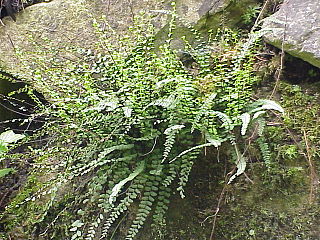
Asplenium is a genus of about 700 species of ferns, often treated as the only genus in the family Aspleniaceae, though other authors consider Hymenasplenium separate, based on molecular phylogenetic analysis of DNA sequences, a different chromosome count, and structural differences in the rhizomes. The type species for the genus is Asplenium marinum.

Myosotis is a genus of flowering plants in the family Boraginaceae. The name comes from the Ancient Greek μυοσωτίς "mouse's ear", which the foliage is thought to resemble. In the Northern Hemisphere, they are colloquially known as forget-me-nots or scorpion grasses. Myosotis alpestris is the official flower of Alaska and Dalsland, Sweden. Plants of the genus are not to be confused with Chatham Islands' forget-me-nots, which belong to the related genus Myosotidium.

Adenophorus is a genus of ferns in the family Polypodiaceae, subfamily Grammitidoideae, according to the Pteridophyte Phylogeny Group classification of 2016 (PPG I). The genus is endemic to Hawaii.
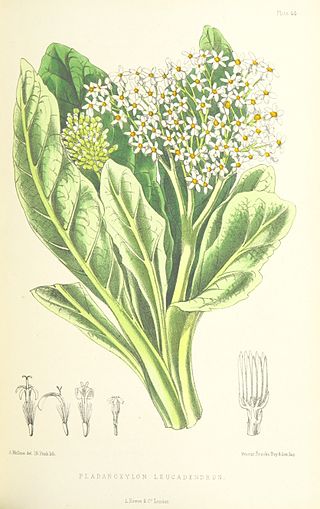
Pladaroxylon is a genus of trees in the tribe Senecioneae within the family Asteraceae.
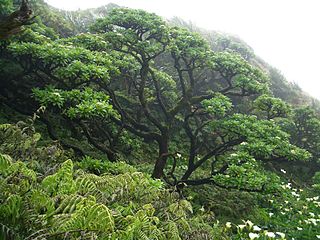
The flora of Saint Helena, an isolated island in the South Atlantic Ocean, is exceptional in its high level of endemism and the severe threats facing the survival of the flora. In phytogeography, it is in the phytochorion St. Helena and Ascension Region of the African Subkingdom, in the Paleotropical Kingdom.

Mellissia was formerly a monotypic genus in the family Solanaceae with the single species, Mellissia begoniifolia, endemic to the island of Saint Helena. It was named by Joseph Dalton Hooker in honour of John Charles Melliss, a 19th-century engineer and amateur naturalist who worked on Saint Helena.
Tectiphiala ferox, or palmiste bouglé, is a species of flowering plant in the family Arecaceae. It is endemic to Mauritius.

The Leptopteris is a small genus of ferns native to the New Guinea, Australia, New Zealand, and the Pacific Islands. They are similar to ferns in the related genus Todea, and were originally included in that genus. However, the very thin fronds of Leptopteris differ from the thick leathery fronds of Todea, and the genera are considered distinct. A probable extinct species, Leptopteris estipularis is known from the Early Cretaceous of India.
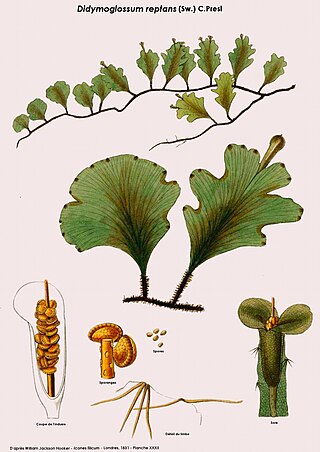
Didymoglossum is a tropical genus of ferns in the family Hymenophyllaceae. It comprises more than 30 epilithic or low-epiphytic species under two subgenera. The genus is accepted in the Pteridophyte Phylogeny Group classification of 2016, but not by some other sources which sink it into a broadly defined Trichomanes.

Bosea cypria is a species of flowering plant in the Amaranthaceae family. It is a highly branched, evergreen shrub, 1–2 m high, erect, suberect, or hanging on walls, cliffs or trees, with hairless angular shoots. Leaves, opposite, simple, entire-+ elliptical, 2-6 x (1-2-3) cm, hairless, petiolate, dark green, occasionally red green. Flowers in branched spikes, hermaphrodite or unisexual 5-merous, very small, green brown, the floral symmetry is actinomorphic. The fruit is a globose red berry. Flowers from April to July. It is endemic to Cyprus and in the local Greek Cypriot dialect it is called ζουλατζιά

Pseudocarapa championii is a species of tree in the Meliaceae family. It is endemic to Sri Lanka.

Mickelopteris is a genus of ferns in the subfamily Cheilanthoideae of the family Pteridaceae with a single species Mickelopteris cordata. Synonyms include Parahemionitis cordata and Hemionitis cordataRoxb. ex Hook. & Grev. The species is native to south-eastern Asia, from India to Taiwan and the Philippines.
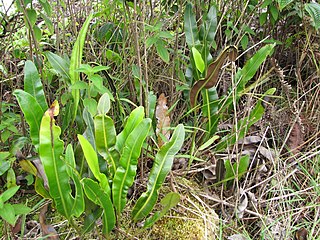
Elaphoglossum is a genus of ferns in the family Dryopteridaceae, subfamily Elaphoglossoideae, in the Pteridophyte Phylogeny Group classification of 2016.
Asplenium haughtonii, also known as the Barn fern, is a species of fern in the family Aspleniaceae. It is native to Saint Helena.
Dryopteris cognata, the large kidney fern, is a herbaceous plant, a member of the Dryopteridaceae family.
Elaphoglossum nervosum, the veined tongue-fern, is a herbaceous plant, a member of the Dryopteridaceae family.
Euphorbia heleniana or French grass or Saint Helena spurge is a herbaceous plant, a member of the Euphorbiaceae family.
Eragrostis episcopulus, the cliff hair grass, is a species of grass endemic to St. Helena. The species is classified as Critically Endangered because of its extremely restricted range and population fragmentation.












